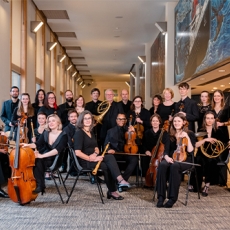Dunedin Consort - J.S. Bach: Christmas Oratorio - MusicWeb International
John Butt's Bach and Handel recordings with the Dunedin Consort have become things to look forward to, and this Christmas Oratorio is another mightily successful feather in his cap.
Butt's small but perfectly formed team of experts, under his own equally expert leadership, make a crack team when it comes to this music, skilled as they are in performances of Bach's other large scale sacred music. There is a tremendous sense of excitement in this performance. You hear it in a lot of things - Butt's pacey tempi, for example - but it's generated first and foremost from the crack instrumentalists and the special character of the sound. To use the two most obvious examples, the trumpets gleam triumphantly, adding wonderful colour to the moments when they are used, and the horns sound magnificent in Part Four, gloriously ceremonial and wonderfully open. On the other hand, the Sinfonia that opens Part Two is graceful and beautifully pastoral, while the solo obbligati for the arias are all excellent. Listen, for only one example, to the way the violins lean ever-so-subtly into certain phrases as they dazzle around the tenor line in Ich will nur dir zu Ehren leben in Part Four. That's typical of the skill and organic vivacity of the music-making that brings this score to such vibrant life.
As is his regular practice, Butt broadly adopts one-to-a-part for the choruses and, typically for him, he has a particular sort of performance in mind, which he explains in the booklet notes. Unlike his Messiah, Christmas Vespers or St John Passion, however, he isn't trying to recreate a particular performance but instead to "present the range of choral scoring that Bach seems to have used" which, in practice, comes down to him using two groups of soloists for different cantatas: Bevan, Wilkinson, Mulroy and Brook for Cantatas One, Three and Six; Lunn, Hendrick, Hobbs and Wolff for Cantatas Two, Four and Five.
You'll either buy this or you won't, and I'm not always convinced by it myself, but this is the most persuasive case for one-to-a-part that I can imagine. There are obvious gains in transparency and immediacy and, in this of all works, it adds to the sense of community singing intrinsic to the chorales. It's also welcome that the soloists emerge from the choral texture and vice-versa, reinforcing that this is a communal adventure. There's the feel of a friendly dance (among close companions) to the angels' chorus of Ehre sei Gott, for example, and some comely bustle to the shepherds as they discuss going into Bethlehem. Similarly, the opening chorus of Part Five trips along with great energy, and the opening chorus of Part Six is a fittingly celebratory climax. The only place where there is an obvious loss is for the dialogues between chorus and soloist, which turn into simple duets, such as Er ist auf Erden kommen arm in Part One.
The singers themselves are all very good. Both sopranos weave beautiful webs of sound through their arias and (even better) their ensembles like Ach, wenn wird die Zeit in Part Five. Joanne Lunn is delightful in the echo aria Flößt, mein Heiland, weaving in and out of the oboe obbligato with grace and ease. Clare Wilkinson has a lovely sense of devotion to her voice in Bereite dich and Schliesse mein Herze, and Ciara Hendrick sounds deeply humane in Schlafe Mein Liebster. Nicholas Mulroy is a mellifluous and marvellously persuasive Evangelist, while Thomas Hobbs sounds light and sweet, and is outstandingly precise in the virtuoso runs of Frohe Hirten and Ich will nur dir zu Ehren leben. Matthew Brook, a regular Butt collaborator, is a standout in the bass solos, both sympathetic and exciting in bravura numbers like Grosser Herr. German bass Konstantin Wolff is darker and, to my ears, a little less satisfying, but still very good.
The warm yet open recording captures all of this in perfect balance, throwing the voices and instruments into beautiful relief and ensuring that absolutely nothing is lost. The presentation is beautiful, too, enclosing the discs in a hardback book that contains biographies, texts and translations; and Butt's own liner notes are a model of accessible scholarship, both historically and musicologically fascinating.
A treat, then, and a marvellous seasonal gift whether you have a seasoned Bachian who wants to hear the work afresh, or you want to introduce a newcomer to it for the first time.


